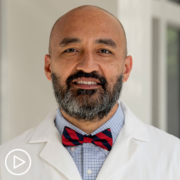Are Clinical Trials Safe? from Patient Empowerment Network on Vimeo.
Clinical researcher Dr. Seth Pollack explains the safety protocols in place for clinical trials, including how data is reported and protected. Patient advocate Sujata Dutta goes on to share her experience in a clinical trial.
Dr. Seth Pollack is Medical Director of the Sarcoma Program at the Robert H. Lurie Comprehensive Cancer Center of Northwestern University and is the Steven T. Rosen, MD, Professor of Cancer Biology and associate professor of Medicine in the Division of Hematology and Oncology at the Feinberg School of Medicine. Learn more about Dr. Pollack, here.
Sujuta Dutta is a myeloma survivor and empowered patient advocate, and serves a Patient Empowerment Network (PEN) board member. Learn more about Sujuta, here.
See More from Clinical Trials 101
Related Resources:
Transcript:
Katherine Banwell:
Some patients feel that clinical trials aren’t safe, is that the case, Dr. Pollack?
Dr. Seth Pollack:
No. I mean, we go through, as I was saying before, these clinical trials are extensively vetted. So, the safety is, of course, one of the things that we look most carefully about. But as I was saying before, like with any treatment’s cancer treatments have toxicity, that’s a common problem. So, and when you’re dealing with something brand new sometimes there is a little bit more risk. So, when you’re talking about these very early-stage Phase I trials you probably want to talk to your doctor about what sorts of toxicities you can expect and where they are in the Phase I trial. Are you the first ever to receive this new drug? And if you are nobody’s making you go in the clinical trial, so it can only help to get more information. Right? So, you should ask your team about it, you should find out.
Most of the time there’s going to be a lot of patients that have been treated already, I mean, they can’t give you definitive data about how things are going but they can maybe say, “Hey. I’ve already treated a few patients on it, and they seem to be doing great.”
Katherine Banwell:
So, you need to weigh the pros and cons of the trial.
Dr. Seth Pollack:
You do need to weigh the pros and cons. Now, when you’re talking about these Phase IIs and Phase IIIs, I mean, these are drugs now that have really been vetted for their safety and we have a lot of data about it. And even the Phase Is, it’s not like these things are coming out of nowhere, they’ve been scrutinized, we really expect that they’re going to be safe but we’re doing the trial to prove it. So, it’s a good thing to ask about.
Katherine Banwell:
Yeah, yeah.
Sujata Dutta:
Yeah. I would also add that it’s so closely monitored that safety is a top priority, it’s front and center. So, the advantage, I think, with being on a trial is the close monitoring of the patient exactly for this reason.
If something is amiss it’s going to be picked up as quickly as possible and you’re any issues are going to be addressed as soon as. So, I think, safety does get addressed pretty quickly.
Katherine Banwell:
Good.
Can data from trials even be trusted? Dr. Pollack, is that the case?
Dr. Seth Pollack:
Well, of course, I mean, it can be trusted. Because the thing with the clinical trial data is that you really see the data and there’s all kinds of scrutiny making sure that the data is reported accurately. Now, there’s a whole other conversation we could have as to whether we could interpret the data differently. And sometimes that is an issue that comes up, but the data is reported very accurately.
So, and there are statistics that are very well understood, and the bar is actually pretty high to say one arm of the trial was better than the other arm of the trial. So, if patients have better survival on one arm, if we say that, usually it means they did considerably better. Enough better that it wasn’t a random chance that one extra patient did better on the treatment arm. No. There were enough patients that did better that the statisticians can go through it with a fine-toothed comb. And they can be absolutely sure up to exactly how many percent sure they can tell you, 0.05 percent or less chance of error that this was a real difference between the study arm and the standard of care arm.
Sujata Dutta:
I think you mentioned too that one is trust, and one is data. So, Dr. Pollack mentioned a lot about the data, I think the trust is also a very important thing. I like to go with positive intent because I do not have a reason to believe my doctor has some ulterior motive to suggest a clinical trial. And so, I trust them wholeheartedly. The first hurdle is you have to trust the system or what is being proposed to you because, as Dr. Pollack said, it’s gone through a lot of vetting. A recommendation to be part of a trial itself is vetted by your doctor when they make the recommendation. So, have faith, trust, that they are making a good recommendation. And then, of course, the data, I don’t know much about that, but as I said, I trust it. So, I would trust the data too.
Katherine Banwell:
Of course. Of course. Some patients feel like they’re going to lose their privacy. Sujata, did you feel that at all?
Sujata Dutta:
No. Not at all.
I mean, with everything else that is also taken care of, my information, or whatever, is not made available to anybody. And so, obviously there’s a lot of people will get those, and I had a huge pile of paperwork to go through, but I think that’s a good thing. For my peace of mind that I knew that my information was not going to be shared outside of the study, the trial, etc., and things. So, no, I don’t think that’s a problem.
Katherine Banwell:
Beyond these misconceptions is there anything else you hear? Dr. Pollack?
Dr. Seth Pollack:
No. I mean, look, in our crazy modern world there’s concerns everywhere, but the clinical trial is very, very careful. Whenever possible we use the medical chart.
And then, we have a very stringently protected database that’s storing people’s information, but it’s deidentified. So, I mean, we have a separate key to figure out who the patients are and then we try to limit the use of the patient’s name or any identifying information about them beyond that. So, and your information is not shared. For example, if there’s a drug company involved in the trial, your information is not shared with the drug company, you have a new identifier that is unique and not traceable back to you that is provided to whoever, if there’s outside groups working on the trial with you. So, your information is very carefully protected, and everyone is very conscious about issues regarding privacy.
Katherine Banwell:
That’s great to know.












